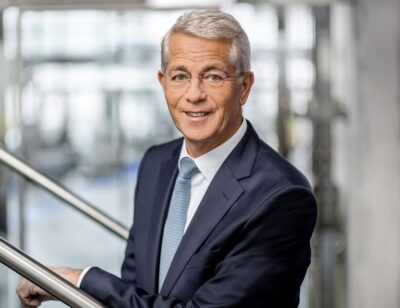Growth was clearly in the double-digit percentage range and Fraport is pleased that this trend is continuing in the current business year.
In advance of Fraport AG’s upcoming regular Annual General Meeting (AGM) of shareholders, the company today published online the speech to be presented by CEO Dr. Stefan Schulte at the event. Fraport’s 2023 AGM will be held at 9:00 a.m. (CEST) on May 23 in a virtual-only format.
Shareholders who have duly registered may exercise their right to request information from the management during the AGM by submitting questions via a live video link.
On the day of the AGM, a live stream of the opening by the AGM’s chairperson and the speech from CEO Schulte will be available to the general public on this website.
Dear Shareholders, Ladies and Gentlemen,
I warmly welcome you to Fraport AG’s Annual General Meeting.
Both in Frankfurt and internationally, an extremely dynamic year with strong demand for air travel lies behind us. Growth was clearly in the double-digit percentage range and we’re pleased that this trend is continuing in the current business year. Following the rapid recovery at the airports in our international portfolio, we are now generating more than half of our operating income outside Frankfurt. This shows how we have transitioned over the past 20 years from being the operator of Germany’s largest aviation hub to one of the leading global airport company. We are currently active at 28 airports on four continents.
Before I take a more detailed look ahead, please allow me to outline how we have steered your company through the third year of the coronavirus pandemic over the past financial year. We have put a particular emphasis on positioning ourselves for continued growth and on advancing major future-focused projects.
Review of the 2022 financial year
Dear Shareholders: The year 2022 marked the long-awaited end of the coronavirus pandemic. With travel restrictions being largely lifted, demand from leisure travelers, in particular, rose sharply from March last year. While monthly growth rates of up to 300 percent are pleasing from a mere business perspective, they also pushed us to our operational limits in Frankfurt. For the full year 2022, passenger numbers in Frankfurt surged by 97.2 percent year-on-year, corresponding to a total of 48.9 million passengers. Even if growth was still largely driven by the demand from leisure
travelers, we did see a noticeable pick-up in business travel in the second half of the year. This trend is continuing into the new year.
Another pleasing aspect: despite difficult conditions for airfreight, Frankfurt remained Europe’s leading cargo hub in 2022.
Our mainly leisure-dominated Group airports worldwide continued to recover more rapidly than the Frankfurt hub with its more complex demand structure. The Greek 3 airports, in particular, performed well: in 2022, they welcomed around four percent more passengers than in pre-crisis 2019 – a new all-time high. Antalya Airport in Turkey and our gateways in South America also made a significant recovery.
At this point, please allow me to offer a big thank-you to all of our employees. Across the entire Fraport Group, our employees went all out every day to facilitate travel for our passengers, despite the overall challenging conditions. Their commitment to “pitch in” and work together makes me confident that we will soon be able to offer the quality again that you, our shareholders, expect from Frankfurt Airport, as do our customers, and of course we ourselves. We’ve already done a lot to make this happen. As a result, we were able to maintain operations noticeably more stable over the recent Easter travel peak and long weekends.
Dear Shareholders: last year’s strong traffic growth also provided a major boost to our financial results. Group revenue rose by 49 percent year-on-year to €3.19 billion.
The operating result increased at a slower pace, rising by 36 percent. Operating growth was dampened by the non-recurrence of positive special effects, including the pandemic compensation payments received in 2021, and by increased energy costs, as well as higher operational expenses. These were driven in particular by the hiring of new staff aimed at stabilizing operations at FRA. More than 57 percent of the operating result, i.e. earnings before interest, taxes, depreciation and amortization, was generated by Fraport’s international business. That equates to impressive growth of 40 percent over the previous year, compared to around 31 percent growth from predominantly Frankfurt-related business segments. This underscores how economically significant our global operations now are to us as an airport company.
Our Group result or net profit surged by 81.5 percent year-on-year to €166.6 million in 2022. We even exceeded the forecast we set ourselves – despite the write-off of a shareholder loan in connection with our investment at Pulkovo Airport in St. Petersburg, Russia. We also greatly improved our net debt-to-EBITDA ratio. This key figure improved to a value of 6.9 from 8.4 in 2022, supported by the growth in operational income.
We’re also pleased that we have been able to reduce our carbon footprint under Scope 1 and Scope 2 by 6.5 percent across the Group. Against the backdrop of the strong traffic growth last year, this reduction underlines how seriously we are taking climate protection and that we are making visible progress. Later I will go into more detail about our climate strategy, since this is a very important future issue for us.
Performance and potential of Fraport’s international business
As I just mentioned, more than half of our Group EBITDA was generated outside Frankfurt in 2022. A closer look at this development reveals the strong position we have gained globally as a successful operator of airports.
We are active at 28 aviation gateways on four continents, covering various business segments. Of particular interest to us were and are projects in which we can best put our extensive know-how to work in the operations, management, and development of airports. Following this premise, to date we have successfully focused on investments in emerging and developing markets.
Whenever we acquire a new airport concession, we focus on leveraging that airport’s specific growth potential by
undertaking needs-driven modernization and expansion measures.
The benefits of transforming Fraport into a globally active airport company became particularly evident in the wake of the Covid-19 pandemic. While our home-base airport in Frankfurt has been emerging more slowly from the crisis due to its complexity and greater reliance on business travel, our leisure-dominated Group
airports worldwide are recovering significantly faster. Their greater contribution to Group EBITDA in 2022 (compared to 2019) underscores this fact in a particularly powerful way.
We are very satisfied that our international portfolio continues to see ongoing organic growth. Let me give you some examples to demonstrate this.
The performance of our 14 Greek airports has been impressive. In Greece, we concluded the 2022 business year with a four percent passenger increase – thus even surpassing the record from 2019. We are now reaping the benefits from the comprehensive modernization and expansion measures we undertook at all 14 airports. As a result, we received the first returns on from our Greek investment this year. We are also confident for the upcoming summer season. In the first four months of 2023 alone, the Greek airports achieved cumulative passenger growth of 29
percent, clearly exceeding the rate from the same period of 2022.
Our Brazilian airports in Fortaleza and Porto Alegre also continue to recover from the impacts of the pandemic. In Porto Alegre, we successfully completed the last major infrastructure measure with the opening of the extended runway in 2022. We are now focusing on reducing debt and are expecting to soon receive our first dividend payments from this investment.
At Lima Airport in Peru, expansion work is in full swing. The first expansion phase has been concluded as scheduled, comprising a second runway, upgraded taxiways, and the new air traffic control tower. The construction of the new passenger terminal is also progressing well, to be opened as scheduled in early 2025. We have also successfully concluded the project financing needed for the expansion. By taking these steps, we will be transforming Lima Airport into one of the most modern aviation hubs in South America. Along with the airport’s expansion, the introduction of
state-of-the-art technology and process optimizations will also contribute to achieve this goal. Recently, DFS Aviation Services took over apron management in Lima.
We’re working with this new partner deploying location-independent cameras for monitoring ground traffic in the future. This would make us pioneers in Latin America.
Our Turkish Group airport in Antalya recovered to 92 percent of 2019 passenger numbers in 2022. This year, the aim is to reach pre-crisis figures again. Everyone at our Turkish subsidiary continues to have this goal firmly in their sights. Over the past
few months, attention in Antalya has been focused on relief efforts following the terrible earthquake that impacted the east of the country and Syria. The airport was and remains an important hub for humanitarian aid transports. In the weeks immediately after the massive earthquake, multiple aid flights operated daily to and
from Antalya. The high level of commitment shown by our employees in Antalya filled me with pride, as did the financial donations from many of our staff in Frankfurt. The
relief efforts did not impact regular flight operations. The expansion measures launched in line with the new concession agreement to further raise the airport’s capacity are running to plan. They will form the basis for sustainable growth in Antalya.
Summing up, we can see that, even if we are not currently planning any major acquisitions, the organic growth of our international portfolio still offers plenty of potential. We will consistently harness this potential to support Fraport’s future growth.
GOT NEWS? click here
Google News, Bing News, Yahoo News, 200+ publications
Update on Frankfurt Airport
Dear Shareholders: Let’s now take a look at our home-base Frankfurt Airport. We’re making great progress in Frankfurt too. As planned, we took over the management of Frankfurt Airport’s security checkpoints from the German Federal Police at the start of 2023. The new responsibility gives us more flexibility when it comes to modernizing security technology. We now have seven modern CT scanners in use.
At these checkpoints, our passengers benefit from no longer having to unpack their electronic devices and liquids. This improves the quality of our service for passengers and leads to significantly higher throughput at the checkpoints – without
compromising security. The next four CT scanners are currently being installed and four more are to follow in July. We’re therefore clearly ahead of all other airports in Germany when it comes to the use of this modern security technology. We will keep up the rapid pace of the roll-out. In total, we are planning to have 40 CT scanners in the Terminals by the first half of next year.
Since March of this year, passengers have also been able to book a timeslot for security checkpoints. Even if this is still in a trial phase for now, the new service is being used to great satisfaction by our customers and is providing us with important insights for further optimization of our services.
We are also focusing on improving other processes. By the summer this year, 20 new hybrid check-in counters will be installed in Concourse B of Terminal 1. In addition, 40 baggage drop-off points are being added. The new counters can be operated without the involvement of staff, and passengers can use them around the clock. The new counters will include biometric ID capabilities from the outset. This means customers who wish to use this new technology will be able to identify themselves using their face, instead of their passport or ticket.
The new counters form part of the first completed stage of the “Transforming Terminal 1” project at Frankfurt Airport. The second stage of this project, which comprises the rearrangement and centralization of the security checkpoints in Concourse B, is still in the initial phase. The space gained by the planned rearrangement in the rear area of Concourse B will be enhanced with expanded retail and dining options. Airside passengers will in the future be able to move significantly more easily between concourses A, B and C. Currently, passengers have to change levels when transferring between A and B, because of the security checkpoints located between the two concourses. The construction work required to implement this project will become more and more visible in Concourse B over the coming year.
The modernization will provide a significant upgrade to Terminal 1 in the coming years, with simplified processes and an overall enhanced passenger experience.
Construction works at the future Terminal 3 in the south of our airport are significantly more advanced. The elaborate glass facade of the main building is now finished. The parking building and the roughly 10-kilometer-long new road link are about to be completed. The focus is now shifting more and more on installing the technical fittings in the interior of the new terminal. The first trials for the new Sky Line people mover will be a particular highlight in the second half of the current year.
Dear Shareholders, as you will have noticed in the video that we played just before the start of this year’s AGM, climate protection is another top priority we continue to focus on at Fraport. With the “decarbonization masterplan” that was agreed upon at the start of 2023, we have specified numerous measures in great detail that we will continue to advance as part of our commitment to be carbon-free by no later than 2022.
One very pleasing finding has emerged: we will make faster progress on a number of issues than previously calculated. The current target is for the Group to generate only 95,000 metric tons of CO2 emissions by 2030, instead of the previously planned 120,000 metric tons. In Frankfurt, only 50,000 metric tons of carbon will be emitted, instead of 75,000 metric tons. This means that by as soon as 2030, we will be emitting less than 25 percent of the CO2 volumes that were produced in the 1990 reference year. By 2020, we had already reduced our emissions by 50 percent compared with 1990 levels. These figures underscore that climate action is not just a short-term priority for us. On the contrary: for many years, we’ve been pursuing a step-by-step approach to achieve our climate goals.
Let’s now take a look at the busy summer travel period we expect for 2023. Last year, we increased our staff numbers by over 1,000, mainly in operational roles, and this year we are planning to keep up this hiring pace. The German employment market is exceedingly tight, particularly when it comes to qualified staff. For this reason, many of our new employees come from other EU countries. In response to the low qualification levels currently available on the labor market, we have significantly expanded our training capacities. This includes a larger offering of basic qualifications such as German language certificates and automobile driving licenses.
We have also worked to expand capacities for “on-the-job” qualifications. Specifically, we can now train potential candidates as aircraft loaders within a one-year timeframe without making any compromises on safety and security. Normally, this qualification takes at least two years. Due to the range of measures we have introduced, we expect to be back at 2019 levels for aircraft loader numbers by mid-summer this year.
The major problems we’re facing when it comes to filling vacant positions are clearly reflecting the impacts of a tightening labor market resulting from demographic change. We take this shift very seriously. To meet the challenge of the rapid changes in the labor market, my Executive Board colleague responsible for human resources, Julia Kranenberg, has introduced “HRneo”. This is the biggest employment program we have launched in recent years. The aim of the strategic repositioning of HR is for us to remain an attractive employer for our current staff and new employees, as well as to initiate necessary changes. To do so, we will significantly expand the qualification options throughout the Group. Going ahead, we will place a particularly high value upon life-long learning. Measures such as job rotations are to become part of everyday working life. They help staff to gain a different perspective, while building up useful cross-qualifications at the same time.
We will also continue to further professionalize and digitize the recruitment of new employees. This applies both to processes, but also to targeted recruitment campaigns in countries inside and outside the EU. Current employment realities in the ‘New Normal’ cannot be compared with the period before the pandemic. We are using HRneo to prepare Fraport for the challenges related to this new situation.
While HRneo is rather geared toward medium and long-term improvements, the new collective wage agreement which was recently reached in mediation for the public service will have an immediate impact. The outcome is challenging for us economically, given the clearly rising personnel costs. At the same time, significant salary increases are unavoidable. Higher salaries are an important factor in helping us remain an attractive employer for our employees and to stand out amongst other companies in a highly competitive labor market.
The measures we have taken so far are important particularly in view of the upcoming summer season. We expect passenger numbers during this year’s summer to increase by 15 to 25 percent compared to 2022.
Leisure travelers will continue to be the main growth driver.
Available seat capacity will increase to around 85 percent of 2019 levels in the course of the current summer season. On routes to and from Central America and Africa, the number of flight offerings already exceeds pre-crisis levels, while North America is close behind. Only the Asian market and especially China are still lagging significantly behind. However, as the opening-up continues, we expect a further boost for Asia over the course of
the year. During the summer holidays, passenger numbers are expected to reach peaks of up to 200,000 travelers daily.
During the recent Easter travel period, we passed this year’s first test maintaining overall stable operations. In the first three weeks of the Hessian school holidays alone, some 3.8 million passengers traveled via Frankfurt Airport. During the subsequent busy holiday weekends, operations also ran smoothly. This makes me cautiously optimistic about the peak summer travel period that lies ahead of us.
Outlook
I’m also confident about our financial performance for the current business year. With passenger numbers in Frankfurt expected to reach between 80 and 90 percent of 2019 levels, our earnings situation will further improve. This will also be supported by the expected ongoing traffic growth at our subsidiary airports. As a result, we project Group EBITDA to further advance to a range between approximately €1,040 million and €1,200 million. The upper end of this scale would mean that we will reach 2019
levels again. We expect the Group result to increase significantly, to a range of between around €300 million and €420 million. Due to our high debt levels, as of today we are not proposing any dividend payments for 2023. Only once your company comes closer to a net debt-to-EBITDA ratio of 5 do we plan to resume
dividend payments.
Dear Shareholders: Let me close with a forecast for the medium term. The most important message is that our growth trends are intact. We expect passenger numbers at our international subsidiaries to recover to pre-crisis levels during this financial year, and we will see the same rebound in Frankfurt in 2025, or in 2026 at the latest. At our home-base airport, we will be well-equipped for further substantial organic growth from 2026 onwards when the new Terminal 3 will become operational, as scheduled. This will provide us with a major competitive advantage in Germany and will help us to benefit from the growth expected here over the coming years and decades. The German Federal Ministry of Transport and Digital Infrastructure recently published a very insightful study on how different modes of transport in Germany would develop in coming years. For aviation, the ministry
expects growth of 67 percent by 2051 from the levels seen in 2019.
As the fully constructed Terminal 3 will have additional capacity for around 25 million passengers annually, your company will largely be well-equipped to handle this increase both landside and airside.
This means we are soundly positioned both internationally and within Germany.
This is a positive outlook for you as our shareholders and for all of our employees across the Group.
Thank you for the confidence you place in us. We appreciate your loyalty to us and to Fraport AG.
Media Contact:
Christian Engel
Corporate Communications
Media Relations
Phone+49 69 690-30713
c.engel2@fraport.de







